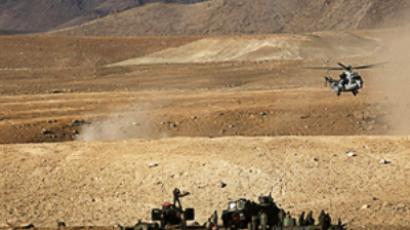ROAR: Obamamania bypasses Russia

During a visit to Moscow, the U.S. president will have to fight skepticism in Russia of both his policies and his image.
A recent survey may have found Barack Obama the most-trusted of the world leaders, but Russians seem untouched by Obamomania.
Nevertheless, Russian observers are interested in the Obama phenomenon, if not in Russia then on the world arena.
Mihail Neizhmakov, head of the Center for International Politics at the Institute of Globalization and Social Movements believes that Obama’s leadership seems entirely explicable.
Obama himself “has made several steps to improve the image of the U.S. and his own image in different countries of the world”, Neizhmakov wrote on the Kommentarii.ru web portal.
The expert believes that Obama’s efforts to boost image are more effective in Europe than in the countries of the Middle East. Will the upcoming visit help him to boost his image in Russia?
According to the poll conducted by Levada Center at the end of June, only 42 percent of respondents believe that the Russian-U.S. relations will improve dramatically or even slightly after Obama’s visit to Moscow.
Almost 40 percent of those polled said that relations would not change at all. However, only three percent of respondents believe Russian-U.S. relations might deteriorate after the meeting of the leaders of the two countries. One is left to guess how long it will take to wait until the “reset” in U.S. relations with Russia becomes fruitful.
Obama will try to boost his image in Russia, despite it not being his main task in Moscow, observers believe. His decision to grant an interview to the Russian liberal newspaper Novaya Gazeta is interpreted as one of his attempts to achieve this. The paper is famous for criticizing the authorities.
Aleksey Makarkin, deputy general director of the Center for Political Technologies, told the Polit.ru web portal: “if Medvedev has given an interview to Novaya Gazeta, why doesn’t Obama do the same?”
“Obama’s interview, on the one hand, should show the interest of the United States in different political forces in Russia, and Americans’ support for the idea of the freedom of speech,” Makarkin said.
“On the other hand, because the Russian president recently gave an interview to the same paper, this would not look like a challenge to the Russian authorities; as something confrontational,” he added. Makarkin thinks the move was agreed to by the Russian authorities, and “they would not take it in a negative way.”
One may also recall a question constantly asked in the West nine years ago: “Who is Mr. Putin?” Now many seem to wonder, what is more important for Obama – his policies or his image? “Policies are always more important than image,” John Wohlstetter, a U.S. foreign policy and national security expert told RT Online. “Image disconnected from policies is a mirage,” he added.
“Ultimately, Iran and North Korea figured out that George Bush was more talk than action, and proceeded with their nuclear programs accordingly,” said Wohlstetter, the founder and editor of the blog “Letter from the Capitol”.
Image helps politicians who know how to use it properly. “Vladimir Putin calculated that Bush would not intervene to save Georgia from dismemberment,” Wohlstetter noted.
“Conversely, Bush's promotion of democracy in Afghanistan and Iraq aided both good (Lebanese, Ukrainian, Georgian) and bad (Palestinian) democracy promotion,” he added.
“Image, however, can help greatly in selling policies to the American people, and in making unpopular policies less unpalatable overseas,” Wohlstetter said.
This time it will be Russia where Obama’s image is to be tested. Despite the fact that the majority of Russians are not interested in such topics as missile defense or strategic arms reduction, one can be assured that local TV channels will spend a lot of airtime covering “the image side” of Obama’s visit.
During an unofficial program of the visit, the U.S. President should be ready to answer questions regarding not only the financial crisis or the promotion of democracy in the world.
Obama will deliver a speech before students of the New Economic School in Moscow. The school’s director of development, Aleksey Sitnikov, told Svobodnaya Pressa (Free Press) website that the students were going to ask Obama if he knows who Ksenia Sobchak is.
Sobchak is a prominent Russian socialite, but, no doubt, Obama has a good chance of eclipsing her and other representatives of Russia’s elite while in Moscow.
Some Russian experts believe that this might be the only achievement during Obama’s visit. Sergey Mikheev, vice president of the Center for Political Technologies, told the Nakanune.ru website that “a PR-action has been organized involving Obama” because the U.S. side does not demonstrate “any readiness to make concessions” in different fields.
“What is the essence of the U.S. stances – only that they declared ‘reset’ and that is all?” Mikheev asked. “Sorry, but this is pure PR,” he added.
Aleksey Malashenko, an expert of the Moscow Carnegie Center, believes, on the contrary, that “Barack Obama-ism” is not a tactic. However, it is not clear what Obama’s policy towards Russia is, Malashenko writes in an article published by Nezavisimaya Gazeta daily.
“Is this simply strategy or foresight?” Malashenko asks, adding that Obama is the first U.S. president possessing a new thinking, “in which the Soviet Union and Russia have been ultimately divided into different parts of history”.
Sergey Borisov, RT













